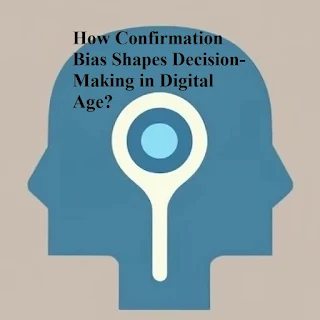Defining Confirmation Bias
Defining confirmation bias involves understanding how this
cognitive bias affects our judgment and decision-making. At its core, confirmation
bias leads people to seek out, interpret, and remember information
that supports their preexisting views. This bias can result in distorted
thinking and poor decision-making because individuals ignore or undervalue
evidence that contradicts their beliefs.
What Is Confirmation Bias?
What is confirmation bias? It is the tendency to search
for, interpret, and remember information in a way that confirms one’s
preexisting beliefs or opinions. For example, if someone believes that a
particular diet is effective, they may focus only on success stories and ignore
evidence of failures or alternative viewpoints.
Psychology of Confirmation Bias
The psychology of confirmation bias reveals that this
cognitive bias is deeply rooted in our cognitive processes. It simplifies the
processing of information and helps maintain a consistent worldview. However,
it can also lead to significant errors in judgment and decision-making.
Understanding the psychological mechanisms behind confirmation bias is crucial
for recognizing its effects and mitigating its impact.
Confirmation Bias Examples
To grasp confirmation bias examples, consider the following
scenarios:
1. Social
Media: On platforms like Facebook or Instagram, algorithms often
reinforce users’ existing beliefs by showing content that aligns with their
past interactions. This creates echo chambers where users are less exposed to
diverse perspectives, reinforcing their preexisting views.
2. Digital
Marketing: Marketers might use confirmation bias to
target ads based on user behavior and preferences. For instance, if a consumer
frequently buys eco-friendly products, they will see more advertisements for
similar items, reinforcing their green shopping habits.
3. Political
Opinions: Individuals often consume news from sources that align with
their political views. For example, a person with conservative views might
predominantly follow conservative news outlets, which can reinforce their
beliefs while ignoring liberal viewpoints.
Confirmation Bias Example in Real Life
A confirmation bias example in real life can be seen in the
context of health-related decisions. Suppose a person believes that a specific
supplement improves mental health. They may focus on anecdotal success stories
and testimonials while disregarding scientific research that shows no
significant benefits. This selective attention to supportive evidence
exemplifies how confirmation bias affects personal decision-making.
Confirmation Bias in the Digital Age
In the digital age, confirmation bias has
become more pronounced due to the personalization of content. Algorithms on
social media and search engines curate content based on users' past behavior,
which can amplify existing biases and create filter bubbles. For instance, if a
user frequently searches for conspiracy theories, they are likely to encounter
more content that supports those theories, reinforcing their beliefs.
Confirmation Bias in Digital Marketing
In digital marketing, understanding and leveraging
confirmation bias can be both a tool and a challenge. Marketers often use this
bias to tailor ads and content to align with consumers' existing preferences
and beliefs. For example, a brand might use data on a customer's past purchases
to recommend products that match their established interests, thereby
increasing the likelihood of engagement and conversion.
However, this also means that marketing strategies can reinforce existing
biases, leading to less diverse and more polarized consumer behavior. Marketers
need to balance personalization with the introduction of new ideas and
perspectives to avoid contributing to echo chambers.
Confirmation Bias in Machine Learning and AI
In machine learning and AI, confirmation bias
can impact the development and performance of algorithms. For instance, if a
training dataset reflects existing biases, the AI model may reinforce those
biases in its predictions and recommendations. This is particularly concerning
in applications like facial recognition or credit scoring, where biased data
can lead to unfair outcomes.
To mitigate confirmation bias in AI, developers must ensure
diverse and representative training data and continually test models for
fairness and accuracy. Implementing strategies to identify and address biases
helps create more equitable and effective AI systems.
Confirmation Bias in Social Commerce
In social commerce, confirmation bias
influences how consumers interact with brands and make purchasing decisions.
For example, users who follow fashion influencers may be more likely to
purchase products endorsed by those influencers, reinforcing their existing
fashion preferences. Social commerce platforms often leverage this bias to
drive engagement and sales by aligning product recommendations with users’ past
behavior and interests.
FAQs:
What is confirmation bias in simple terms?
Confirmation
bias is the tendency to favor information that supports your existing
beliefs while ignoring or dismissing contradictory evidence.
How does confirmation bias affect digital marketing?
In
digital marketing, confirmation bias helps tailor ads to align
with consumer preferences but can also reinforce existing biases and limit
exposure to diverse perspectives.
Conclusion
Confirmation bias is a powerful cognitive force that shapes
how we process information and make decisions. In the digital age, its impact
is amplified by algorithms and personalization strategies in social media,
digital marketing, and AI. Understanding and recognizing confirmation
bias helps in developing more balanced and fair approaches in
technology and decision-making. By addressing this bias, individuals and
organizations can foster more informed, diverse, and equitable outcomes.

Comments
Post a Comment